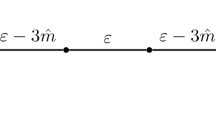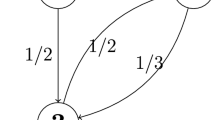Abstract
We consider a discrete opinion formation problem in a setting where agents are influenced by both information diffused by their social relations and from recommendations received directly from the social media manager. We study how the “strength” of the influence of the social media and the homophily ratio affect the probability of the agents of reaching a consensus and how they can determine the type of consensus reached.
In a simple 2-symmetric block model we prove that agents converge either to a consensus or to a persistent disagreement. In particular, we show that when the homophily ratio is large, the social media has a very low capacity of determining the outcome of the opinion dynamics. On the other hand, when the homophily ratio is low, the social media influence can have an important role on the dynamics, either by making harder to reach a consensus or inducing it on extreme opinions.
Finally, in order to extend our analysis to more general and realistic settings we give some experimental evidences that our results still hold on general networks.
Partially supported by GNCS-INdAM and by the Italian MIUR PRIN 2017 Project ALGADIMAR “Algorithms, Games, and Digital Markets”.
Access this chapter
Tax calculation will be finalised at checkout
Purchases are for personal use only
Similar content being viewed by others
Notes
- 1.
Figures only shows experimental results only for some of the considered networks. Similar results have been obtained for the other network models.
References
Acar, E., Greco, G., Manna, M.: Group reasoning in social environments. In: AAMAS. pp. 1296–1304 (2017)
Allcott, H., Braghieri, L., Eichmeyer, S., Gentzkow, M.: The welfare effects of social media. Am. Econ. Rev. 110(3), 629–76 (2020)
Androniciuc, A.I.: Using social media in political campaigns. Evidence from Romania. SEA-Pract. Appl. Sci. 4(10), 51–57 (2016)
Anunrojwong, J., Candogan, O., Immorlica, N.: Social learning under platform influence: extreme consensus and persistent disagreement. In: SSRN (2020)
Auletta, V., Caragiannis, I., Ferraioli, D., Galdi, C., Persiano, G.: Minority becomes majority in social networks. In: Markakis, E., Schäfer, G. (eds.) WINE 2015. LNCS, vol. 9470, pp. 74–88. Springer, Heidelberg (2015). https://doi.org/10.1007/978-3-662-48995-6_6
Auletta, V., Caragiannis, I., Ferraioli, D., Galdi, C., Persiano, G.: Generalized discrete preference games. In: IJCAI, pp. 53–59 (2016)
Auletta, V., Caragiannis, I., Ferraioli, D., Galdi, C., Persiano, G.: Information retention in heterogeneous majority dynamics. In: Devanur, N.R., Lu, P. (eds.) WINE 2017. LNCS, vol. 10660, pp. 30–43. Springer, Cham (2017). https://doi.org/10.1007/978-3-319-71924-5_3
Auletta, V., Caragiannis, I., Ferraioli, D., Galdi, C., Persiano, G.: Robustness in discrete preference games. In: AAMAS, pp. 1314–1322 (2017)
Auletta, V., Fanelli, A., Ferraioli, D.: Consensus in opinion formation processes in fully evolving environments. In: AAAI, pp. 6022–6029 (2019)
Auletta, V., Ferraioli, D., Greco, G.: On the complexity of reasoning about opinion diffusion under majority dynamics. Artif. Intell. 284, 103288 (2020)
Auletta, V., Ferraioli, D., Greco, G.: Optimal majority dynamics for the diffusion of an opinion when multiple alternatives are available. Theoret. Comput. Sci. 869, 156–180 (2021)
Auletta, V., Ferraioli, D., Savarese, V.: Manipulating an election in social networks through edge addition. In: Alviano, M., Greco, G., Scarcello, F. (eds.) AI*IA 2019. LNCS (LNAI), vol. 11946, pp. 495–510. Springer, Cham (2019). https://doi.org/10.1007/978-3-030-35166-3_35
Bakshy, E., Messing, S., Adamic, L.A.: Exposure to ideologically diverse news and opinion on Facebook. Science 348(6239), 1130–1132 (2015)
Benigni, M.C., Joseph, K., Carley, K.M.: Online extremism and the communities that sustain it: detecting the ISIS supporting community on Twitter. PLoS ONE 12, 1–23 (2017)
Bhawalkar, K., Gollapudi, S., Munagala, K.: Coevolutionary opinion formation games. In: STOC, pp. 41–50 (2013)
Bilò, V., Fanelli, A., Moscardelli, L.: Opinion formation games with dynamic social influences. Theoret. Comput. Sci. 746, 444–458 (2018)
Bindel, D., Kleinberg, J.M., Oren, S.: How bad is forming your own opinion? Games Econom. Behav. 92, 248–265 (2015)
Bredereck, R., Elkind, E.: Manipulating opinion diffusion in social networks. In: IJCAI, pp. 894–900 (2017)
Castiglioni, M., Ferraioli, D., Gatti, N., Landriani, G.: Election manipulation on social networks: seeding, edge removal, edge addition. J. Artif. Intell. Res. 71, 1049–1090 (2021)
Chierichetti, F., Kleinberg, J., Oren, S.: On discrete preferences and coordination. J. Comput. Syst. Sci. 93, 11–29 (2018)
Corò, F., Cruciani, E., D’Angelo, G., Ponziani, S.: Exploiting social influence to control elections based on scoring rules. In: IJCAI, pp. 201–207 (2019)
Dandekar, P., Goel, A., Lee, D.T.: Biased assimilation, homophily, and the dynamics of polarization. Proc. Natl. Acad. Sci. 110(15), 5791–5796 (2013)
DeGroot, M.: Reaching a consensus. J. Am. Stat. Assoc. 69(345), 118–121 (1974)
Feldman, M., Immorlica, N., Lucier, B., Weinberg, S.M.: Reaching consensus via non-Bayesian asynchronous learning in social networks. In: APPROX/RANDOM, pp. 192–208 (2014)
Ferraioli, D., Goldberg, P., Ventre, C.: Decentralized dynamics for finite opinion games. Theoret. Comput. Sci. 648, 96–115 (2016)
Ferraioli, D., Ventre, C.: Social pressure in opinion games. In: IJCAI, pp. 3661–3667 (2017)
Fotakis, D., Kandiros, V., Kontonis, V., Skoulakis, S.: Opinion dynamics with limited information. In: Christodoulou, G., Harks, T. (eds.) WINE 2018. LNCS, vol. 11316, pp. 282–296. Springer, Cham (2018). https://doi.org/10.1007/978-3-030-04612-5_19
Fotakis, D., Palyvos-Giannas, D., Skoulakis, S.: Opinion dynamics with local interactions. In: IJCAI, pp. 279–285 (2016)
Friedkin, N., Johnsen, E.: Social influence and opinions. J. Math. Sociol. 15(3–4), 193–206 (1990)
Fujiwara, T., Müller, K., Schwarz, C.: The effect of social media on elections: Evidence from the united states. Tech. rep, National Bureau of Economic Research (2021)
Gilbert, E.N.: Random graphs. Ann. Math. Stat. 30(4), 1141–1144 (1959)
Halberstam, Y., Knight, B.: Homophily, group size, and the diffusion of political information in social networks: evidence from Twitter. J. Public Econ. 143, 73–88 (2016)
Hegselmann, R., Krause, U.: Opinion dynamics and bounded confidence: models, analysis and simulation. J. Artif. Soc. Soc. Simul. 5, 1–24 (2002)
Kempe, D., Kleinberg, J., Tardos, E.: Maximizing the spread of influence through a social network. In: KDD, pp. 137–146 (2003)
Kernighan, B.W., Lin, S.: An efficient heuristic procedure for partitioning graphs. Bell Syst. Tech. J. 49(2), 291–307 (1970)
Krioukov, D., Papadopoulos, F., Kitsak, M., Vahdat, A., Boguná, M.: Hyperbolic geometry of complex networks. Phys. Rev. E 82(3), 036106 (2010)
Leskovec, J., Krevl, A.: SNAP datasets: Stanford large network dataset collection (2014). http://snap.stanford.edu/data
Levy, R.: Social media, news consumption, and polarization: evidence from a field experiment. Am. Econ. Rev. 111(3), 831–70 (2021)
Lin, Z., Francis, B., Maggiore, M.: Necessary and sufficient graphical conditions for formation control of unicycles. IEEE Trans. Autom. Control 50(1), 121–127 (2005)
McAuley, J.J., Leskovec, J.: Learning to discover social circles in ego networks. In: NIPS, vol. 2012, pp. 548–556 (2012)
Mossel, E., Neeman, J., Tamuz, O.: Majority dynamics and aggregation of information in social networks. Auton. Agent. Multi-Agent Syst. 28(3), 408–429 (2013). https://doi.org/10.1007/s10458-013-9230-4
Olfati-Saber, R.: Flocking for multi-agent dynamic systems: algorithms and theory. IEEE Trans. Autom. Control 51(3), 401–420 (2006)
Olfati-Saber, R., Shamma, J.S.: Consensus filters for sensor networks and distributed sensor fusion. In: CDC, pp. 6698–6703 (2005)
Rozemberczki, B., Sarkar, R.: Characteristic functions on graphs: birds of a feather, from statistical descriptors to parametric models. In: CIKM, pp. 1325–1334 (2020)
Savkin, A.V.: Coordinated collective motion of groups of autonomous mobile robots: analysis of Vicsek’s model. IEEE Trans. Autom. Control 49(6), 981–982 (2004)
Shearer, E., Matsa, K.E.: News use across social media platforms 2018 (2018). https://www.pewresearch.org
Sina, S., Hazon, N., Hassidim, A., Kraus, S.: Adapting the social network to affect elections. In: AAMAS, pp. 705–713 (2015)
Tanner, H.G., Pappas, G.J., Kumar, V.: Leader-to-formation stability. IEEE Trans. Robot. Autom. 20(3), 443–455 (2004)
Watts, D.J., Strogatz, S.H.: Collective dynamics of ‘small-world’ networks. Nature 393(6684), 440–442 (1998)
Wilder, B., Vorobeychik, Y.: Controlling elections through social influence. In: AAMAS, pp. 265–273 (2018)
Author information
Authors and Affiliations
Corresponding author
Editor information
Editors and Affiliations
Rights and permissions
Copyright information
© 2022 The Author(s), under exclusive license to Springer Nature Switzerland AG
About this paper
Cite this paper
Auletta, V., Coppola, A., Ferraioli, D. (2022). On the Impact of Social Media Recommendations on Opinion Consensus. In: Bandini, S., Gasparini, F., Mascardi, V., Palmonari, M., Vizzari, G. (eds) AIxIA 2021 – Advances in Artificial Intelligence. AIxIA 2021. Lecture Notes in Computer Science(), vol 13196. Springer, Cham. https://doi.org/10.1007/978-3-031-08421-8_18
Download citation
DOI: https://doi.org/10.1007/978-3-031-08421-8_18
Published:
Publisher Name: Springer, Cham
Print ISBN: 978-3-031-08420-1
Online ISBN: 978-3-031-08421-8
eBook Packages: Computer ScienceComputer Science (R0)




